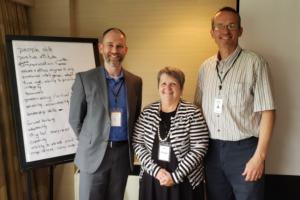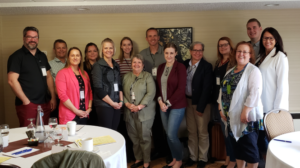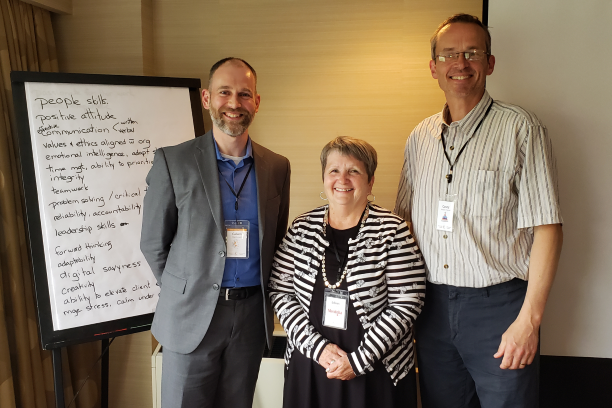Tourism HR Canada spent June 12th to 14th in Saskatoon, Saskatchewan, participating in several events related to determining the future skills needed by the tourism workforce. Team members interacted with a variety of tourism stakeholders, exchanging valuable insights on the short- and long-term opportunities and challenges facing the sector.
The Need for Flexible Employment
The Saskatchewan Tourism Education Council (STEC) held its fourth annual Tourism Workplace Leadership Conference on June 12th. This one-day learning and networking conference connects educators, frontline employees, mid-level managers, and those who are Emerit certified or are currently pursuing certification.
 Calum MacDonald, Tourism HR Canada’s Vice-President of Labour Market Intelligence, presented at the Educator Forum, a venue for trainers and educators to explore the opportunities and challenges of guiding youth into long-term, rewarding careers in tourism. This session provided an overview of the opportunities available to youth and others setting out in their careers, and the tools and resources available to workers and employers.
Calum MacDonald, Tourism HR Canada’s Vice-President of Labour Market Intelligence, presented at the Educator Forum, a venue for trainers and educators to explore the opportunities and challenges of guiding youth into long-term, rewarding careers in tourism. This session provided an overview of the opportunities available to youth and others setting out in their careers, and the tools and resources available to workers and employers.
A critique often levelled at tourism is that the jobs are seasonal, low-paying, and precarious. But this ignores who fills tourism jobs: over 30 percent are occupied by young people aged 15 to 24. They fill a higher share of jobs in tourism than in any other industry.
For those in school full-time, as many of these youth are, a part-time or seasonal job meets the needs dictated by their schedule. The low earnings associated with those jobs are often because they are part-time, seasonal, or may be supplementary to other income.
These are also often first jobs: a valuable place to learn skills and an initial entry point to the labour market. Over four in five Canadians say skills learned working in the tourism industry are relevant (37%) or somewhat relevant (46%) to developing skills that would allow them to be successful in their career. Labelling these jobs as precarious ignores the fact that starting in a “low-skilled” job does not preclude using it as a springboard to a career in the sector.
Future Skills Are Present Concerns
Tourism HR Canada also presented on the future skills needed by the tourism workforce. This session showed how the changing nature of work and increasing economic importance of tourism provide new opportunities to support tourism growth.
Attendees learned how Tourism HR Canada’s Future Skills Framework introduces a new approach to addressing mismatches between skills and labour to help employers and workers pinpoint opportunities to perform more effectively.
Delegates discussed the general concern people are feeling about the economy. Despite economic numbers being quite good (including the lowest unemployment rate in forty years), people feel there is an inherent instability in today’s economic systems and are not convinced tomorrow will be as good as today.
Further, the skills workers require are changing. Individuals are less likely to stay in a single job or career. Instead, they will work in many unrelated fields, or in multiple environments at the same time. The complexity of the skill sets required focus on adaptability and flexibility.
Having a breadth of skills rather than a deep mastery of one single set of skills is the future. The demand for skills that can be replaced by technology is declining, while the demand for advanced cognitive skills, socio-behavioral skills, and skill combinations associated with greater adaptability is rising.
Of further concern: Artificial Intelligence and machine learning threaten to force people out of work as industry finds ways to automate jobs currently filled by people. The tourism sector is somewhat immune to these trends due to the service-oriented nature of the industry and the need for flexibility. One of the benefits of human staff is adaptability. After the lunch rush, your cashier can clean tables and help prepare for the dinner rush. People are flexible. So far, machines are not.
But automation can replace many tasks, and there is potential for disruption as individuals need time to learn new skills and may find their skills becoming obsolete faster than they can retrain. The workers who will succeed? Those who engage in constant skill upgrading by numerous means. This requires having solid foundational skills that allow for mobility between jobs.
Taking the Lead on Skills
Following the Workplace Leadership Conference, Tourism HR Canada led a two-day discussion of the Future Skills Framework project with subject matter experts from across Canada.
 The Future Skills Framework will be a library of competencies required by workers in the Canadian tourism sector. The session identified and built key competencies that embody leadership in tourism.
The Future Skills Framework will be a library of competencies required by workers in the Canadian tourism sector. The session identified and built key competencies that embody leadership in tourism.
The focus group was facilitated by Lyne Marcil, Director, Psychometric Services. She guided participants through various questions and prepared material to get input and feedback on the overall structure of the framework. The main objectives of the session were to:
- Review and discuss the Future Skills Framework categories and competencies
- Review and develop competencies relating to leadership in the tourism industry
Thanks all those who gathered in Saskatoon to develop competencies and evaluate the Future Skills Framework. The two-day focus group exceeded expectations and the team is grateful to have had the chance to work with the subject matter experts who attended.
Once the data gathered from the event is analyzed, an updated framework will be drafted. The newly drafted framework and competencies will be developed over the summer and presented to industry in a series of focus groups being hosted throughout the fall and winter of 2019-2020.
If you would like the opportunity to review the framework and provide your feedback, please sign up here.

